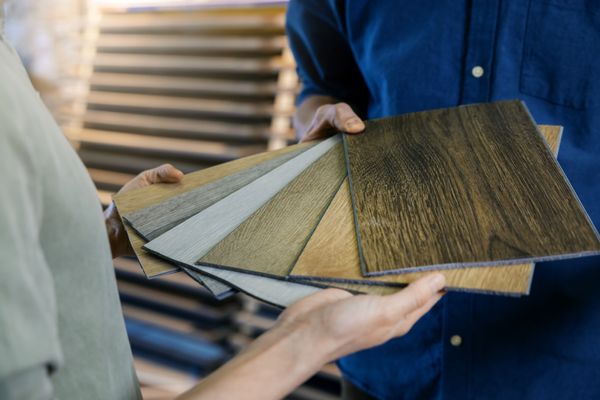
At a Glance:
Floor Care: Laminate vs Vinyl Flooring
Vinyl vs Laminate Flooring for Bathrooms
Installation: Vinyl Plank Flooring vs Laminate
More Vinyl vs Laminate Pros and Cons
Everyone loves the look of hardwood floors, but they just aren’t practical for every household or every room. Hardwood floors are harder to maintain and have shorter lifespans when they are placed in high-moisture rooms like kitchens and bathrooms where laminate and vinyl flooring are more suitable and more affordable alternatives to hardwood floors.
Both have similarities and differences that make them suitable for different parts of your home. Both are able to give you the look of hardwood (or any other texture or material) with a multitude of options for color and design. Here is what you need to know to make the decision of vinyl vs laminate flooring.
Explore Flooring at BlvdHome
Looking for new flooring? Discover hardwood, carpet, tile and more at BlvdHome today!
Shop FlooringWhat is Vinyl Flooring?
Many people think of the old ‘80s sheet vinyl floors when they hear people talk about vinyl flooring. While sheet vinyl is still available at an extremely affordable price, vinyl planks and tiles are much more popular. Luxury vinyl planks (LVP) are the most comparable, and therefore what will be referred to throughout this guide.
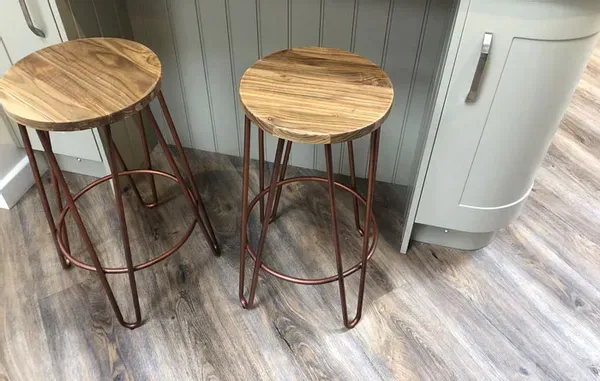
Like so many materials that we take for granted today, vinyl flooring was created in the 1940s with a composite polymer developed through accidental invention. It was one that was improved upon again and again over the years. Today’s vinyl flooring is more durable, easier to install, and easier to maintain than that of the past.
Vinyl plank flooring is best for bathrooms, kitchens, laundry rooms, and mud rooms. It is highly impact-resistant and 100 percent waterproof. Humidity is also no problem for vinyl flooring. It is also the easiest to take care of, requiring just an average mop and all-purpose cleaner to do the job.
Pros of Vinyl Plank Flooring
✅ Affordable: Vinyl plank flooring is budget-friendly, offering a stylish look without breaking the bank.
✅ Durable: It’s resistant to scratches, dents, and daily wear and tear, perfect for busy households.
✅ Waterproof: A great option for bathrooms, kitchens, and basements where spills and moisture are common.
✅ Easy to Clean: Simple sweeping and occasional mopping keep it looking fresh.
✅ Comfortable: It’s softer and warmer underfoot than tile or hardwood, adding a cozy touch to your home.
✅ DIY-Friendly Installation: Click-and-lock systems make it easy for homeowners to install on their own.
✅ Variety of Styles: Vinyl plank flooring comes in a wide range of designs, mimicking hardwood, stone, or tile.
Cons of Vinyl Plank Flooring
❌ Not as Premium: While it mimics the look of hardwood, it doesn’t have the same authentic feel or long-term prestige.
❌ Difficult to Repair: Damaged planks usually need to be replaced, which can be tricky depending on the installation method.
❌ Chemical Sensitivity: Some vinyl products may emit VOCs, which can affect indoor air quality.
❌ Price: While there are affordable vinyl flooring options, LVP can get pricey depending on the design and features.
Price Ranges of Vinyl Flooring
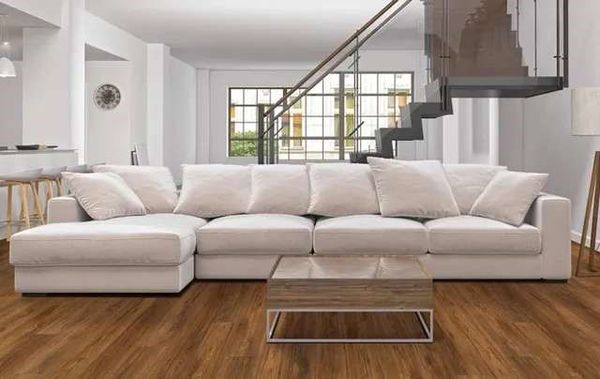
The average price of vinyl flooring is $2-3 per square foot for materials alone, with an additional $1-3 per square foot for labor. However, vinyl flooring can cost up to $11 per square foot when getting the high-end luxury vinyl plank flooring.
Lifespan and Value of Vinyl Flooring
Vinyl flooring does not add much value to your home, but it will give you a durable and functional floor wherever it is laid. Vinyl lasts about 10 years with heavy traffic, but it can last up to 20 years with less traffic and proper care.
What is Laminate Flooring?
Laminate is a newer flooring material developed in the ‘70s using a design of several layers. The base layer is usually made of particle board or other thin material with a somewhat stiff backing. The middle layer has the design of the laminate flooring, whether that is made to replicate wood, stone, brick, or other textures. The top wear layer protects the rest of the laminate while giving the floor a warm, durable surface.
Laminate flooring gives you the most control over the colors and designs used for your flooring. You can use laminate floors to make a statement or add flair to your interior design. The biggest advantage to laminate flooring is that, since it is installed to float above the subfloor, previous flooring may not need to be removed for the new laminate floor to be installed.
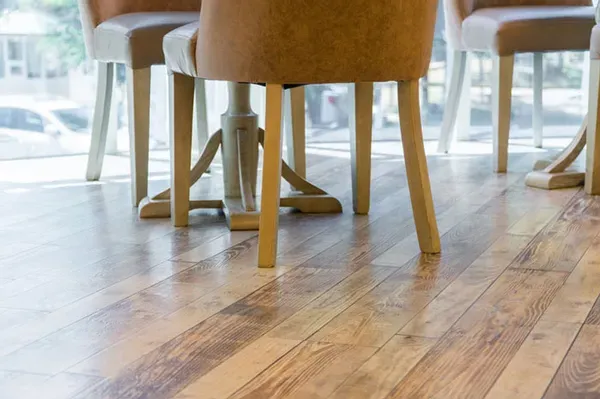
Pros of Laminate Flooring
✅ Affordability: Laminate gives you the look of hardwood or stone at a fraction of the cost, making it a great option for budget-conscious homeowners.
✅ Durability: It’s resistant to scratches, dents, and fading, perfect for busy households or high-traffic areas.
✅ Easy Installation: Laminate often features a click-and-lock system, making it a great DIY project.
✅ Low Maintenance: A simple sweep or damp mop keeps it looking fresh – no waxing or refinishing required!
✅ Variety of Styles: With endless designs and finishes, you can find laminate to match any décor.
Cons of Laminate Flooring
❌ Not Waterproof: Laminate flooring is more prone to damage from moisture and heat, making it unsuitable for most bathrooms and kitchens. Laminate is not waterproof, although small spills cleaned quickly will not cause damage.
❌ Can’t Be Refinished: Unlike hardwood, you can’t sand or refinish laminate, so it may need replacing if damaged.
❌ Feels Less Natural: Laminate doesn’t have the authentic warmth or texture of real wood or stone.
❌ Noise Levels: Without a quality underlayment, laminate can sound hollow underfoot.
Laminate Flooring Price Ranges
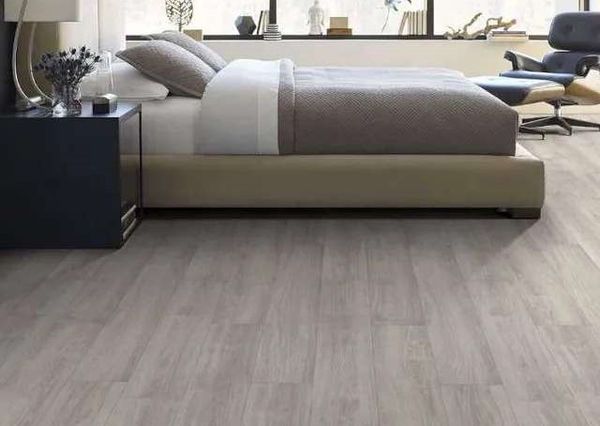
Laminate flooring is much cheaper than vinyl, even though it has a higher ROI when it comes to home value. Laminate flooring costs about $0.70 to $2 per square foot, with installation costing about the same as vinyl flooring.
Lifespan of Laminate Flooring
When properly cared for, laminate flooring lasts much longer than vinyl. This flooring averages 15 to 20 years, although quality laminate can last up to 30 years in the right environment and proper maintenance.
→ Learn more: Flooring: When Will It Arrive?
Floor Care: Laminate vs Vinyl Flooring
Laminate and vinyl flooring may seem similar on the surface, but they differ greatly in their care and maintenance. It is a common myth that all floors can be cleaned the same way. Proper cleaning of your floors is important for their lifespan.
Laminate flooring is best cleaned with a dry dust mop. A Swiffer or similar dust mop is a great option, but consider using reusable cloths rather than disposable ones as this helps reduce unnecessary waste.
Vinyl flooring can be cleaned with just about anything you would already be using to clean the room. An all-purpose cleaner with a wet mop is generally quick, easy, and more than sufficient.
→ Learn more: How to Properly Care for All Your Flooring
Vinyl vs Laminate Flooring for Bathrooms
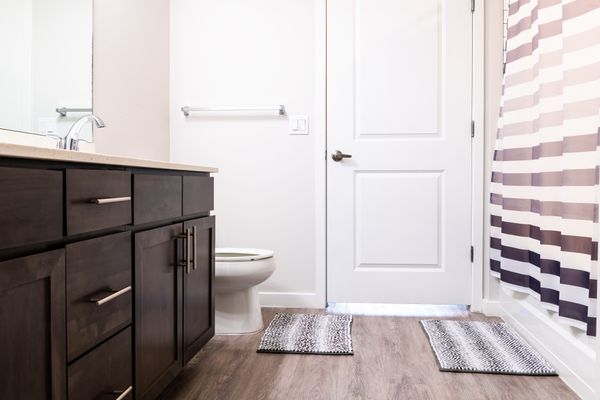
Bathroom flooring requires a bit more consideration. Bathroom floors need to withstand pooling water, steam, and humidity.
Vinyl flooring is 100 percent waterproof and is not impacted by humidity. It is also impact-resistant and heat-resistant to stand the abuse from falling curling irons and other bathroom incidents.
On the other hand, laminate cannot hold up against frequent steam, humidity, or pools of water left to stand on the surface. In fact, many laminate flooring manufacturer warranties are voided when installed in a bathroom.
Installation: Vinyl Plank Flooring vs Laminate
The installation of laminate vs vinyl flooring are very similar. Both LVP and laminate are made to be tongue and groove, clicking together effortlessly with no grout or sealant needed to protect the subfloor.
Laminate is installed to float above the subfloor, but so can vinyl. Vinyl differs in that it can also be glued to the subfloor for better durability.
Laminate flooring is installed by snapping it together above the subfloor or pre-existing flooring. It is very easy to snap together, but still requires some skill in measuring and cutting the tiles or planks to fit the room’s features.
Vinyl flooring is installed in a similar way, although vinyl tiles may be glued down rather than installed as a floating floor. Vinyl flooring should be installed directly on the subfloor, which means that there is more labor involved if there is flooring material to be removed prior to installation.
More Vinyl vs Laminate Pros and Cons
Laminate and vinyl have a few other differences that might influence your decision. If you’re more worried about the look of your floors, laminate gives you the most flexibility and control in interior design.
Laminate also increases your home’s resale value more than vinyl, even though it costs less to install. Of the three top hard flooring materials that add to your home’s value, laminate is beat by hardwood, with vinyl coming in last for home value.
Laminate is more scratch resistant than vinyl, and is warmer on bare feet. Vinyl floors are cold, but absorb sound and vibrations from running or stomping children. Laminate floors are best for entryways, little-used guest bathrooms, and dining rooms. Vinyl floors are suitable almost anywhere in the home, especially if you get cushioned or padded vinyl flooring.
Flooring Near Me FAQ
Here are a few of the questions our flooring experts hear the most.
Why does it cost more to install vinyl flooring vs laminate?
It may seem counterintuitive to pay more to install flooring that doesn’t really increase the value of your home. Vinyl flooring costs more to install because the previous flooring must be removed down to the subfloor prior to installation. If you are laying laminate on a floor previously covered with a hard material like vinyl, the laminate floor can float above it saving some labor in preparing for installation.
What does it mean that laminate is water resistant?
Laminate is water resistant but not 100 percent waterproof. What is the difference? Being waterproof requires a material to be unchanged and undamaged by standing water. Water resistance is when liquids do not absorb quickly into the flooring, but it can cause damaged if not cleaned up right away. The occasional wet mop is okay when needed, but putting laminate in a room constantly exposed to water will decrease its lifespan.
Can I install vinyl vs laminate DIY?
Homeowners often look for ways to decrease costs of home improvement, and installing flooring yourself can be tempting. Especially when installing snap-together flooring like vinyl and laminate, it may seem that installation is simple enough for anyone to handle.
However, there are many reasons you should not install your flooring yourself. There are many factors that can affect the choice of flooring material and how it is installed. The flooring experts at BlvdHome are more than happy to handle the installation for you promptly and on your schedule.
Where to buy flooring near me?
If you're located in or around South Utah to Las Vegas, visit a BlvdHome location to explore various flooring near you!
Why Trust BlvdHome?
The roots of this family business began as early as the pioneer settlement of Southern Utah. One descendant of those 1861 pioneers was Lester Wittwer. In 1928, he started a trucking business with other family members, delivering homegrown fruits and vegetables to many outlying areas. The story of BlvdHome began in 1974, when Lester’s son Tony decided to venture off into the furniture world - with two full-time employees and a small showroom of only 8,000 square feet. Today, BlvdHome has 4 retail locations with over 160,000 sq. ft. of showroom space, located in St. George, Utah, Hurricane, Utah, Cedar City, Utah, Mesquite, Nevada, and a new Las Vegas store coming soon. With over 230 amazing team members, BlvdHome continues to deliver on a commitment to customer service that started over 90 years ago.
Shop Flooring at BlvdHome
At BlvdHome, we provide quality name-brand appliances, furniture, and mattresses for great prices. Shop flooring online or visit us today at one of our locations in Utah or Nevada. In the meantime, browse our website to shop BlvdHome Bargain Barn and check out our flooring selections to increase your home value. More available than ever, our experts at BlvdHome are always happy to help you learn the difference between laminate vs vinyl flooring, whether you call us or use our online chat feature. Contact us today!
→ Learn more: What Flooring Should I Get?
